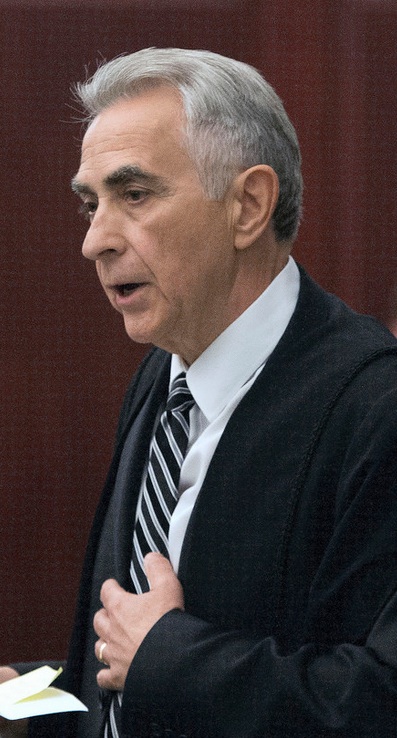Medicine Hat MLA Bob Wanner was elected Speaker of the Alberta Legislative Assembly in a House vote yesterday, and it was all done peaceably enough.
The only competition to Wanner, who retired as the City of Medicine Hat’s top civil servant a decade ago, was Progressive Conservative David Rodney, the MLA for Calgary-Lougheed who is best known for having climbed Mount Everest twice.
Alas for Rodney, the Speaker’s chair turned out to be a summit too high even for an experienced mountaineer when the NDP majority had already set its heart on Wanner, who was thrown into the election at the last minute when the party’s candidate in the southeastern Alberta city withdrew in mid-campaign after an embarrassing contretemps with a voter to which police were called.
Despite a certain amount of harrumphing by the two conservative opposition parties a month ago when Wanner slipped and revealed that he was the choice of the governing party, the issue never engaged voters as anything to be particularly interested in, let alone upset about. The assessment of most Albertans was “inside baseball… who cares?”
Nevertheless, the Wildrose Opposition had some fun yesterday nominating other New Democrats, who said no thank you, and then arguing that the Speaker really ought to be a woman. This is a proposition for which a solid case can be made, but which is pretty rich coming from a caucus in which female membership is less than 10 per cent compared to the NDP’s 46 per cent. The NDP cabinet, famously, breaks down 50/50 along gender lines.
Well, you know, boys will be boys… The Wildrose Party will have the opportunity to criticize the NDP for something more substantial on Monday afternoon when the NDP’s first Throne Speech is read by just-appointed Lieutenant Governor Lois Mitchell, giving Albertans the first glimpse of the policies the government intends to make law in the next session.
While Premier Rachel Notley and other members of her government are being tight-lipped about the contents of the Throne Speech, one thing that seems certain to be in it is the election promise to raise Alberta’s minimum wage to $15 over three years from the country’s lowest.
This has prompted a full-court press among the usual suspects in the right-wing outrage industry — market fundamentalist think tanks, Astro-Turf groups that purport to represent small businesses, restaurant industry lobbyists and local chambers of commerce – all claiming civilization as we know it will end if the provincial government interferes with the sacred workings of the market.
Among the signs of this coming civilizational termination will be mass layoffs of workers and higher prices in fast-food restaurants, we are repeatedly warned.
This campaign runs in parallel with another one by the same actors begging the federal government to interfere immediately with the workings of the market by reopening the temporary foreign worker spigot. Someday we’ll figure out the state of ideological perfection in which this is all supposed to work.
With astonishing empathy, a delegation of low-wage employers and their representatives even begged the premier not to raise the minimum wage to protect the working poor from having to pay higher taxes.
The NDP, to its great credit, is so far sticking to its guns and indicating it will keep its promise to raise the minimum wage.
Government ready to work with Athabasca U — but is AU ready to work with government?
Yesterday’s AlbertaPolitics.ca report on the findings of a task force appointed by Athabasca University President Peter MacKinnon seems to have motivated the mainstream media to seek the thoughts of Advanced Education Minister Lori Sigurdson on the future of the public distance-learning institution.
In a statement, Sigurdson told the media “the Alberta government is ready to work with the university and help it become more sustainable.”
While she provided few details, this suggests the NDP is committed to saving AU, even if the university’s current administration doesn’t want it saved if it can’t have a fight over collective bargaining.
In a comment on yesterday’s post, 36-year AU history professor Alvin Finkel pointed to administrative bloat and under-funding as the principal problems plaguing the institution. “At its core, in terms of its courses, the quality of its faculty and staff, there is not much wrong with Athabasca University,” wrote Finkel, who is now retired. “Proper funding and a stripped-down administration would allow Athabasca U to operate as successfully as it did from 1995 to 2005.”
The former professor argued: ‘The entire board should be fired along with President MacKinnon, author of a book that argues for universities to be run like big corporations with absolute powers for the president.”
MacKinnon, a prominent lawyer said to have once been considered for the Supreme Court of Canada and a former president of the University of Saskatchewan, argues in his 2014 book that “governments should make it clear to public universities with faculty unions that they will not tolerate encroachment through collective bargaining upon governance arrangements set out in legislation or charters.”
This is an argument that seems unlikely to find much uptake within NDP leadership circles.
This post also appears on David Climenhaga’s blog, AlbertaPolitics.ca.



